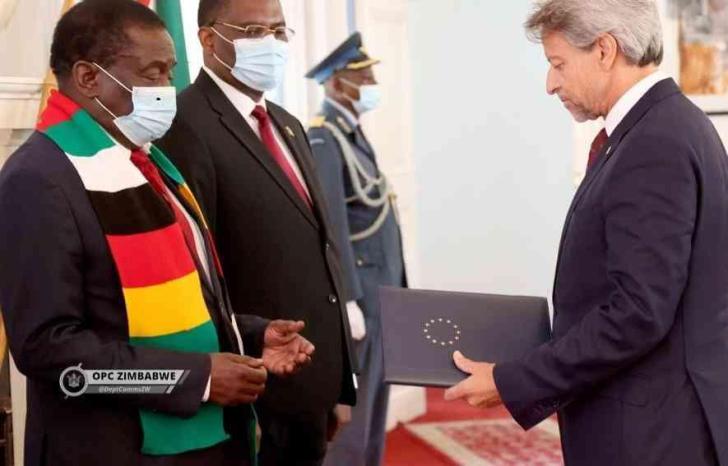News / Local
Zimbabwe struggles to capitalize on EU trade opportunities
20 Sep 2024 at 08:37hrs |
0 Views

Zimbabwe has yet to fully exploit significant export opportunities within the European Union (EU) under a duty-free agreement, despite the EU's vast market, which boasts a US$19 trillion gross domestic product (GDP). In contrast, the African Continental Free Trade Area's GDP stands at US$3.4 trillion.
In an email response to the Zimbabwe Independent, EU Ambassador to Zimbabwe Jobst von Kirchmann expressed optimism about the potential for trade between Harare and Brussels to reach US$1 billion in the coming years, up from approximately US$750 million last year. However, he noted that only 200 Zimbabwean firms are currently taking advantage of the Economic Partnership Agreement (EPA) established a decade ago.
Von Kirchmann's comments raise concerns about the effectiveness of President Emmerson Mnangagwa's engagement policy, aimed at improving relations with the EU amid frustration over slow reforms. He stated, "In 2023, trade between Zimbabwe and the EU stood at €658 million, with Zimbabwe exporting €346 million worth of goods to the EU and importing €312 million," resulting in a positive trade balance of €34 million for Zimbabwe.
The key exports from Zimbabwe to the EU include agricultural products such as sugar, blueberries, oranges, and mange-tout peas, along with minerals. Despite these opportunities, the limited number of registered exporters highlights a substantial gap in potential trade.
"The EPA, in place since 2012, provides Zimbabwe with duty-free and quota-free access to all 27 EU member states," von Kirchmann explained. "However, only about 200 Zimbabwean companies are currently registered to export to the EU, leaving considerable room for growth."
The EU has also been involved in assisting Zimbabwe in addressing its US$21 billion debt. The EPA allows Zimbabwe to export value-added goods without duties, making it essential for local companies to leverage this platform. "The EPA simplifies customs procedures, reduces barriers, and aligns standards, making it easier for Zimbabwean businesses to export to the EU," he noted.
To enhance trade relations, von Kirchmann stressed the importance of local businesses focusing on value-added products in agriculture and mining. This strategy could attract more European investment in Zimbabwe's industries.
In addition to trade, the EU is actively participating in Zimbabwe's debt clearance process, led by African Development Bank (AfDB) President Akinwumi Adesina. The EU ambassador co-chairs the governance track of this process, focusing on promoting reforms related to transparency and accountability.
Zimbabwe owes US$427 million to the European Investment Bank, primarily in arrears and penalties, further complicating its financial situation. While there are no specific bilateral discussions regarding this debt, the EIB is involved in broader creditor negotiations.
As Zimbabwe navigates its economic challenges, the need to capitalize on the opportunities presented by the EU remains crucial for enhancing trade relations and securing much-needed financial support.
In an email response to the Zimbabwe Independent, EU Ambassador to Zimbabwe Jobst von Kirchmann expressed optimism about the potential for trade between Harare and Brussels to reach US$1 billion in the coming years, up from approximately US$750 million last year. However, he noted that only 200 Zimbabwean firms are currently taking advantage of the Economic Partnership Agreement (EPA) established a decade ago.
Von Kirchmann's comments raise concerns about the effectiveness of President Emmerson Mnangagwa's engagement policy, aimed at improving relations with the EU amid frustration over slow reforms. He stated, "In 2023, trade between Zimbabwe and the EU stood at €658 million, with Zimbabwe exporting €346 million worth of goods to the EU and importing €312 million," resulting in a positive trade balance of €34 million for Zimbabwe.
The key exports from Zimbabwe to the EU include agricultural products such as sugar, blueberries, oranges, and mange-tout peas, along with minerals. Despite these opportunities, the limited number of registered exporters highlights a substantial gap in potential trade.
"The EPA, in place since 2012, provides Zimbabwe with duty-free and quota-free access to all 27 EU member states," von Kirchmann explained. "However, only about 200 Zimbabwean companies are currently registered to export to the EU, leaving considerable room for growth."
The EU has also been involved in assisting Zimbabwe in addressing its US$21 billion debt. The EPA allows Zimbabwe to export value-added goods without duties, making it essential for local companies to leverage this platform. "The EPA simplifies customs procedures, reduces barriers, and aligns standards, making it easier for Zimbabwean businesses to export to the EU," he noted.
To enhance trade relations, von Kirchmann stressed the importance of local businesses focusing on value-added products in agriculture and mining. This strategy could attract more European investment in Zimbabwe's industries.
In addition to trade, the EU is actively participating in Zimbabwe's debt clearance process, led by African Development Bank (AfDB) President Akinwumi Adesina. The EU ambassador co-chairs the governance track of this process, focusing on promoting reforms related to transparency and accountability.
Zimbabwe owes US$427 million to the European Investment Bank, primarily in arrears and penalties, further complicating its financial situation. While there are no specific bilateral discussions regarding this debt, the EIB is involved in broader creditor negotiations.
As Zimbabwe navigates its economic challenges, the need to capitalize on the opportunities presented by the EU remains crucial for enhancing trade relations and securing much-needed financial support.
Source - the independent
Join the discussion
Loading comments…































